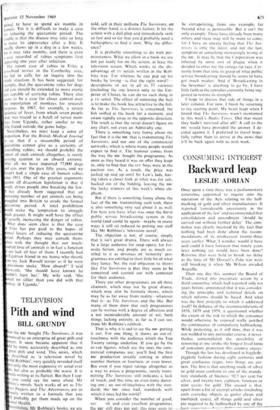TELEVISION
Pith and wind
BILL GRUNDY
en the BBC bought The Survivors, it was ounced as an enterprise of great pith and ment. It soon became apparent that it Id be more accurately described as one great pith and wind. This series, which described as 'a television novel by rold Robbins', very quickly revealed itself ot only the most expensive TV serial ever e, but also as probably the worst. It is ula writing at its flattest. But then I sup- you could say the same about Mr bins's novels. Such works of art as The Pet Baggers and The Adventurers are so ously written to a formula that you d probably get them made up on the onal Health.
evertheless_ Mr Robbins's books. we are told, sell in their millions The Survivors, on the other hand, is a distinct failure. It hit the screen with a dull plop and immediately sank so fast and so far that you'd probably need a bathysphere to find it now. Why the differ- ence?
It is probably something to do with per- missiveness. What we allow in a book we are not yet ready for on the screen, at least the television screen. Which works to the dis- advantage of TV serials written in the Rob- bins way. For whereas he can pep up his books by loving—is that the right word?— descriptions of sex in all its 57 varieties (including the one known only to the Em- peror of China), he can do no such thing in a TV serial. The effect of removing the bait is to make the hook less attractive to the fish. As far as The Survivors is concerned, the fish sniffed at the hook for a moment, and swam rapidly away in the opposite direction. The result is that the serial doesn't figure on any chart, not even an Admiralty one.
There is something very funny about the fact that it is the nnc that is transmitting The Survivors, and not one of the commercial networks, which is where many people would expect to find it. The humour comes from the way the BBC bought the programme. As soon as they heard it was on offer they leapt in, only to find that the ITV boys were at the auction too. As a result, the price was jacked up and up until Sir Lew's lads, hav- ing taken a closer look at what was for sale. backed out of the bidding, leaving the BBC the lucky winners of this week's white ele- phant.
But if there is something funny about the fact of the BBC transmitting such tosh, there is also something very sad about it as well. For here you have what was once the finest public service broadcasting system in the world (and could be again—maybe in many ways it still is) reduced to putting out stuff like Mr Robbins's 'television novel'.
The objection is not, of course, simply that it isn't great drama. There will always be a large audience for soap opera, for for- mula fiction, and people are as much en- titled to it as devotees of 'minority' pro- grammes are entitled to their little bit of what they fancy. No, the real objection to shows like The Survivors is that they seem to be conceived and carried out with contempt for their audience.
There are other programmes, on all three channels, which may not be great drama, which may also be formula shows, which may be as far away from reality—whatever that is—as The Survivors and the like. But many of them show that such programmes can be written with a degree of affection and a not inconsiderable amount of wit, both things lacking entirely, as far as I can see, from Mr Robbins's rubbish.
That is why it is sad to see the BB( putting it out. For one thing, it shows an out-of- touchness with the audience which the Top Twenty ratings underline. If you go by the iicrAR figures, which are the ones the com- mercial companies use, you'll find the first BBC production usually coming in about number thirteen or fourteen, or even lower. But even if you reject ratings altogether as a way to assess a programme, surely trans- mitting The Survivors still indicates a lack of touch, and this time an even more damn- ing one ; an out-of-touchness with the stan- dards the BBC once had, standards with which it once led the world?
When you consider the number of good,
ver td, and even excellent programmes the BBC still does nut out, this may seem tn be extrapolating, from one example, far beyond what is permissible. But it isn't the only example. There have already been many others and there may still be more to come, for I have an uneasy feeling that The Sur- vivors is only the latest, and not the last, symptom of something increasingly wrong at the BBC. It may be that the Corporation was infected by some sort of plague when it decided to enter for the ratings rat race. Cer- tainly from that time its grasp of what public service broadcasting should be seems to have got much weaker. And if 'Broadcasting in the Seventies' is anything to go by, 1 have little faith in the remedies currently being sug- gested to restore its strength.
I hope to discuss that side of things in a later column. For now. I finish by returning to my starting point. My heart leapt when I found that The Survivors wasn't mentioned in this week's Radio Times. Did that mean they hadn't survived after all? A call to the BBC would have provided the answer. I de- cided against it. I preferred to travel hope- fully rather than to arrive at the news that it'll be back again with us next week.






































 Previous page
Previous page